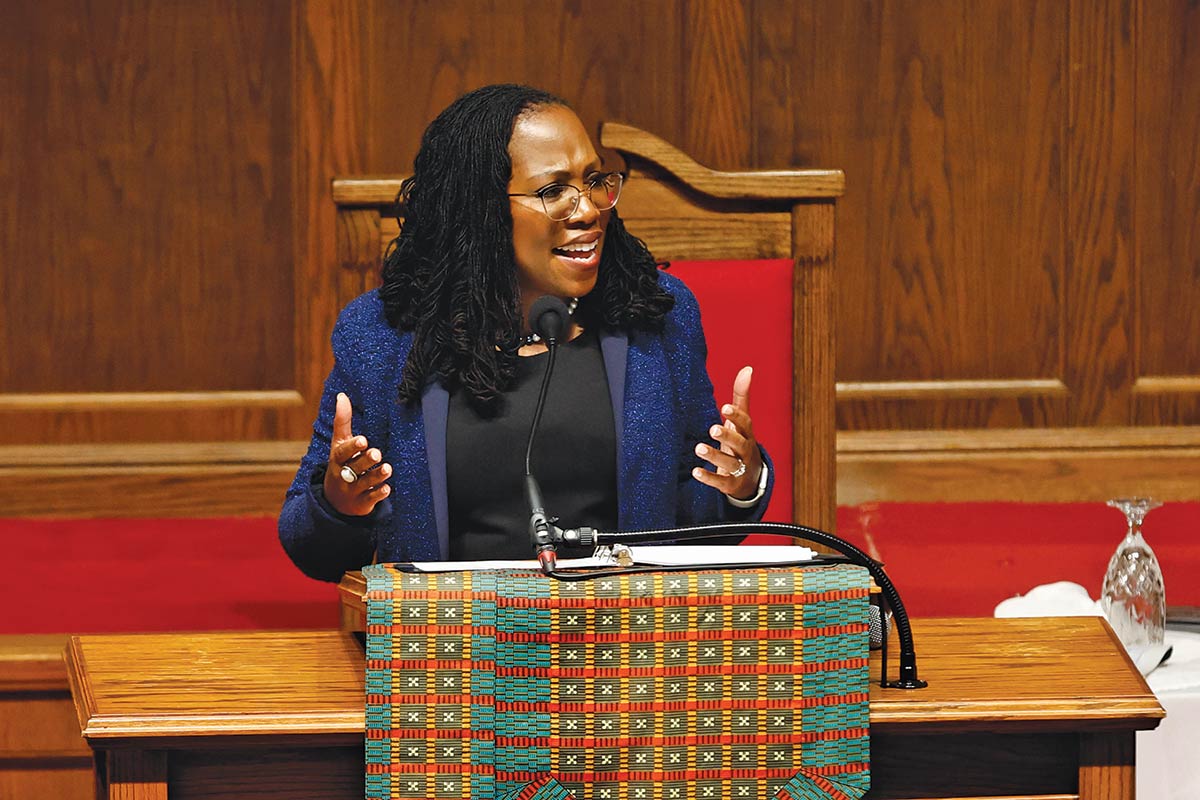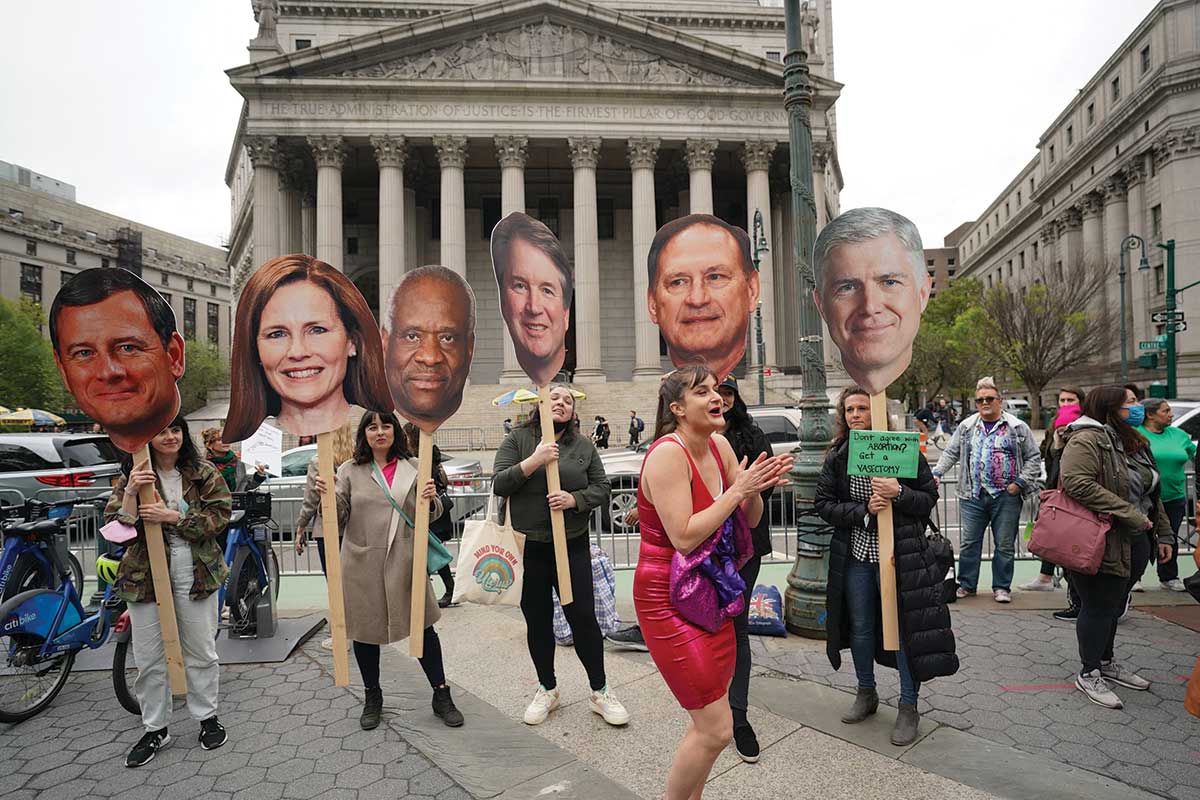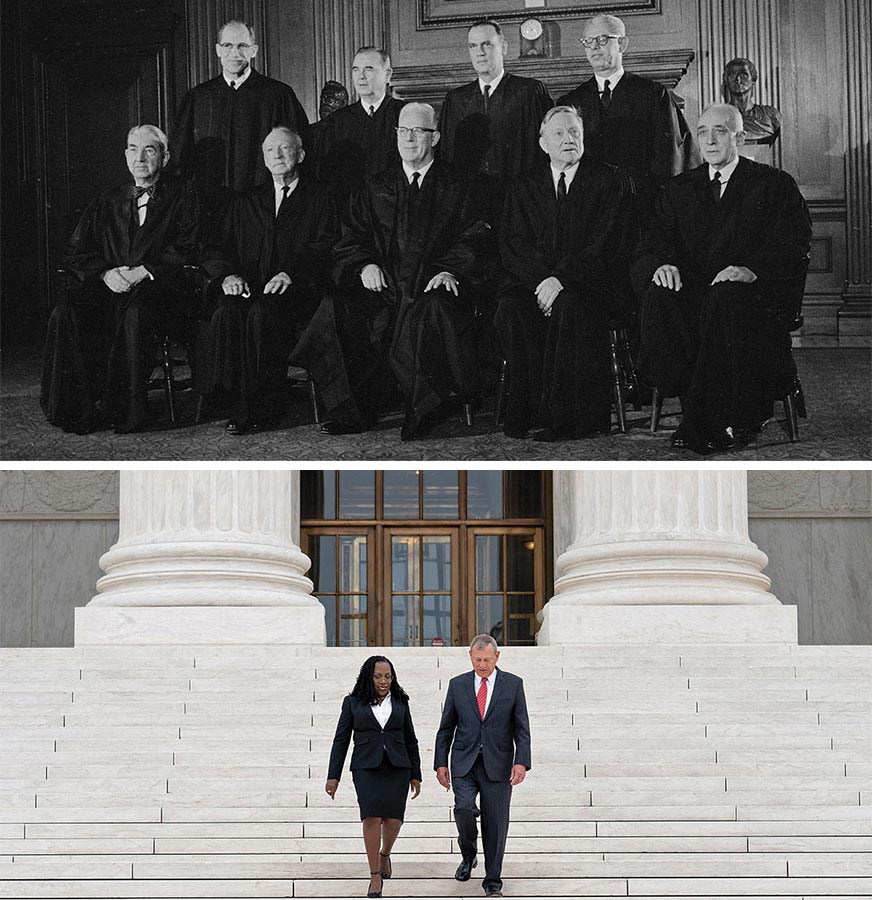Ketanji Brown Jackson Is Redefining What It Means to Be a Liberal Justice
During her short time on the Supreme Court, Jackson has articulated a skepticism toward judicial power that feels particularly urgent in a post-Roe world.

The Supreme Court is the most antidemocratic branch of government. Its justices are nominated, not elected, and they hold their positions for life, making them unaccountable to the people whose rights and liberties they curtail. For at least the past 24 years, ever since the court installed George W. Bush as president instead of permitting a recount of votes cast in Florida, the Republicans controlling the court have been increasingly hostile to democracy. They’ve gutted the Voting Rights Act, allowed states to gerrymander away the voting power of entire constituencies, overturned or vitiated popular legislation regarding gun safety and environmental protection, and expanded their own power at the expense of the other branches.
The president and Congress have done nothing to stop these attacks on democracy. Lawmakers won’t pass an ethics bill to prevent justices from engaging in corruption. They won’t cut the court’s budget. The president and Congress won’t even consider passing court expansion, the surest constitutional method for bringing an extremist, antidemocratic court to heel. They’re willing to write strongly worded letters appealing to Chief Justice John Roberts to do something, but the branches elected by the people won’t use their actual powers to reform the court. The result is that people nobody voted for routinely punk the people everybody voted for, and all that our elected representatives do is shrug and tell us to vote harder (and they do this even as the court itself tries to make those votes functionally meaningless).
So it’s been all the more startling to see that one of the few public officials who seems interested in stopping the antidemocratic court from stomping all over the elected branches of government is a member of the Supreme Court itself. Ketanji Brown Jackson, the newest justice, has been on the court only two years. But in that time, she has shown herself to be not only willing but eager to call out her colleagues’ frequent attempts to inflate the Supreme Court’s power. She is certainly the justice who is most willing to let democratic processes resolve issues without court intervention. While time will be the true test, she appears thus far to be developing into that rarest of public servants: a powerful officeholder who doesn’t think their office should hold as much power.
This has been particularly surprising to me because of the history she brings to the job. Jackson wasn’t a blank slate when she was nominated to the Supreme Court in 2022. She had already established a strong record in defense of civil rights, especially for people who are incarcerated, impoverished, or living with disabilities. Traditionally, judges who believe in robust protections for human rights tend to favor strong, aggressive courts. “Democracy,” for all of its charms, tends to leave a lot of people behind. A powerful court that protects the rights of people who will never win a popularity contest can often be the corrective that democracy needs.
Moreover, Jackson is Black, and unlike some Black judges, she’s proud of it. I think that’s relevant when you understand how Black liberals of my generation (and Jackson’s, I believe) were taught to view the court and its power, particularly during the critical period of the civil rights era. It was the court, not democracy, we were told—usually by white people through their media and educational structures—that “ended” segregation and Jim Crow laws. A strong, respected, and, yes, antidemocratic court was needed to protect people of color and vulnerable groups from the tyranny of the white democratic majorities.
As it turns out, this story wasn’t entirely true. It was social justice movements and the laws they pushed by means of the democratic process that changed the country. Brown v. Board of Education was important, but it wouldn’t have defeated Jim Crow without the 1964 Civil Rights Act and the 1965 Voting Rights Act. All we really needed the Supreme Court to do was prevent states from violating the 14th and 15th Amendments (a job the court refused to do for nearly 100 years), extend those constitutional protections to women and the LGBTQ community, and uphold popular laws, passed by Congress, over the objection of racists.
Still, I must confess that I find myself unwilling to fully reject the old view; I know what white people are capable of, and the specter of unchecked white majorities fills me with dread. Justice Jackson, in contrast, seems motivated by the old adage “The cure for the evils of democracy is more democracy.” She has shown a willingness to let the voters decide the critical issues—except the issue of who gets to vote. On that question, on the fundamental question of who gets to participate in our democracy, Jackson unequivocally says “everybody” and is in favor of using the full power of the court to make that a reality.
Jackson’s approach is already distinct from that of her immediate predecessor, Stephen Breyer. Breyer was a centrist pragmatist who thought the court could assert as much power over Congress, or be as deferential to it, as was needed to accomplish the goals of a free and fair society. Nor does Jackson appear to fully adopt “living constitutionalism,” the theory, often associated with liberal justices, that the Constitution is an evolving document whose precepts must match modern definitions and sensibilities. Instead, she’s carving out a unique jurisprudence that looks first at the text, then at the history, and then tries to figure out what the people’s elected representatives were trying to accomplish when they wrote the laws or constitutional amendments. The other liberal justices, Sonia Sotomayor and Elena Kagan, do this too, but Jackson seems more concerned than any of her colleagues with fitting the court within the structures of democracy, instead of letting the court overpower the elected branches of government.
This doesn’t necessarily lead to the political conclusions I would like—and I can’t say that I agree with all of Jackson’s opinions. But her approach is clear and consistent. Her career is still evolving, but what she’s done so far has been intellectually thrilling. There’s a possibility that we’re looking at the early stages of a new kind of liberal jurisprudence.

As of this writing, Jackson has authored 12 majority opinions for the Supreme Court. Those cases have, admittedly, been relatively unimportant. I’m sure I’m supposed to say, “Every Supreme Court case is important,” and they are… for somebody. But pretending that every case has equal relevance to the functioning of our democracy is how you get really bad “statistical” analyses that purport to show that the conservative supermajority is actually very moderate and cool. Conservatives have an iron grip on the Supreme Court: They get to choose which cases are heard, the legal questions argued in those cases, and how the cases are decided. They naturally get to write the controlling opinions in all of the most important cases, because they are winning. The liberals get few (if any) opportunities to shape the law. And as Jackson is the most junior liberal justice, she’s often not the one writing the main dissent to whatever the conservatives have cooked up, as the honor of shouting into the void is given out based on seniority.
Still, it’s possible to get a sense of what Jackson cares about and her jurisprudential worldview—her “vibe,” if you will—by reading her dissents and concurrences, of which she’s written quite a few. What she writes, in cases where she doesn’t have to weigh in, matters.
In May, Jackson wrote a dissent that went against her presumed partisan interests. In a case involving a simple temporary injunction, Robinson v. Callais, competing lower-court rulings had left Louisiana without a constitutionally acceptable map for the upcoming federal elections. One district court ruled that Louisiana’s old map was unconstitutional because it didn’t have enough majority-Black congressional districts, while a different district court ruled that Louisiana’s revised map was unconstitutional because it had too many. When the case got to the Supreme Court, the conservative majority issued a ruling that locked in a map that included two majority-Black congressional districts (which was a win for the NAACP and the other Black voting-rights advocates who brought the case), with the justices arguing was that there wasn’t enough time before the next election for the state Legislature to draw yet another map.
Jackson disagreed. Not only did she think there was enough time for Louisiana to go back to the literal drawing board, she reasoned that the Supreme Court was the body that had caused the delay in the first place by deciding to take the case, which, she argued, could have been adequately resolved by the lower courts. “Were it not for this Court’s intervention,” she wrote, “[the lower court] may have selected a map that complies with both [the Voting Rights Act] and the Equal Protection Clause.” Jackson was making an argument to let the political and legal redistricting process play out, in all of its messiness, even though that process risked producing a map that was less fair to Black voters in the state. It doesn’t get much more “pro-democracy” than allowing the state Legislature in Louisiana to take another crack at drawing a congressional map.
Another way to get a feel for Jackson’s intellectual process is to listen to what she says during oral arguments. One of the highest-stakes cases this term was Looper Bright Enterprises v. Raimondo, which involved a direct challenge to what’s known as “Chevron deference,” the idea that courts should defer to the executive agencies when implementing laws passed by Congress. As far back as oral arguments, which took place in January, it was possible to glean a lot about Jackson’s position. During these arguments, she went toe-to-toe with alleged attempted rapist Brett Kavanaugh over the question of whether a president’s political agenda should be reflected in the actions of their executive agencies. Essentially, the case was about who should have the power to interpret and effectuate the laws passed by Congress: the president, whom everybody elects, or the courts, whom nobody does. Kavanaugh said that the power should not belong to the executive and argued that Chevron was, in the words of one legal scholar, “a source of extreme instability” because the law (as interpreted by the executive agencies) can change wildly every four to eight years, depending on who wins the White House.
Jackson argued that the shifting nature of the law is a feature of democracy, not a bug. “Taking into account the policy goals of the new administration,” she said, “reflects a democratic structure where we have the new administration being elected by the people on the basis of certain policy determinations.” Jackson then elaborated on the role of the court itself, countering Kavanaugh’s worry about legal instability: “I guess my concern is…judicial policymaking is very stable, but precisely because we are not accountable to the people and have lifetime appointments. So, if we have gaps and ambiguities in statutes and the judiciary is coming in to fill them, I suppose we would have a…separation-of-powers concern related to judicial policymaking.”
If that sounds a little wonky, here’s another way to think of it: Consider Jurassic Park. In that story, scientists use “frog DNA” to fill in the gaps in the dinosaur genetic code they are trying to re-create. But that has disastrous consequences for the scientists’ ability to control dinosaur reproduction. During the Chevron argument, Jackson was making the case against using judicial DNA to fill in the gaps left by Congress, saying that it would create the disastrous problem of unaccountable lifetime-appointed judges usurping the will of the people as expressed through elections. (Jackson eventually joined Elena Kagan’s dissent in the case, while the conservative justices overturned Chevron and gave courts, not the people, ultimate authority over the administrative state.)
Jackson has also been able to get her views on the record through her concurrences. She authored an important one in mid-May in a case where she agreed with a decision by Clarence Thomas but took a sharply different route to get there. The case was Consumer Financial Protection Bureau v. Community Financial Services Association of America, and it involved a conservative attempt to defund the bureau by attacking the way Congress had decided to fund it. Thomas relied on his view of 18th-century history to conclude that the CFPB can continue to exist, but he did so by placing the courts in charge of telling Congress how it can fund its priorities.
Jackson took a different tack. “When the Constitution’s text does not provide a limit to a coordinate branch’s power,” she wrote, “we should not lightly assume that Article III implicitly directs the Judiciary to find one…. An essential aspect of the Constitution’s endurance is that it empowers the political branches to address new challenges by enacting new laws and policies—without undue interference by courts.”
If Jackson’s idea here caught on, it would force a huge change in the Supreme Court’s use of power. The current conservative majority is fond of saying that they’re just “following the Constitution,” but what they’re really doing is exploiting it. They use constitutional vagueness as an excuse to allow the courts to step in and resolve questions the way they claim “the founders” would have wanted—and then they tell us it’s merely a coincidence that Thomas Jefferson and James Madison always wanted Mitch McConnell and Donald Trump to win.
In her concurrence, Jackson was arguing that Thomas and his fellow conservatives have it backwards. She argued that, absent an unambiguous limitation in the text of the Constitution, Congress—not the courts—gets to decide what Congress can or cannot do. If there are two reasonable interpretations of the text, the court should not superimpose its interpretation of the Constitution on Congress, even when the conservatives claim to be in séance with the founding fathers. It’s a much more limited role for the court than the one that the conservatives trumpeting “judicial restraint” have been selling for the past 40 years.

For what it’s worth, Jackson’s view is the prevailing one in other democracies. In countries such as Canada, Germany, and South Africa, the high courts do not regularly overrule laws passed by the elected branches of government; their justices are not political stars whose deaths or retirements affect which rights people do and do not have. But in the United States, we consistently let the best guesses of five unelected justices veto entire pieces of national legislation, based on those justices’ kooky theories of what the Constitution might mean. If the Constitution is clear, then of course the courts should step in. But if it’s not, it makes no sense to have unelected rulers place their interpretations over and above those of the representatives that people actually voted for. At least, it makes no sense in a “democracy.”
Popular
“swipe left below to view more authors”Swipe →This approach comes at a cost, however, and the cost is that Jackson is a less reliable vote for standard liberal decisions than some of the other justices. I can’t predict her vote as easily as I can those of, say, Sotomayor, because I never know when her pro-democracy preferences are going to bite my preferred political outcomes in the ass. Jackson has shown a willingness to come to the “wrong” outcome for the “right” reasons.
Jackson also flips the script on how people might expect a liberal justice to reason through a case because of her willingness to use originalism, the conservative interpretative philosophy that says all laws should be calcified in what old dead white men thought long ago. She is quick to use the history, traditions, and “original intent” of laws as they would be understood by the people who wrote them. But I wouldn’t call Jackson an originalist. Instead, I agree with Slate’s Mark Joseph Stern, who coined the phrase “originalism jujitsu” to describe what she is doing. Jackson is willing to use originalism to show that the conservatives are wrong on their own declared terms.
We can see this in Jackson’s dissent in Students for Fair Admissions v. President and Fellows of Harvard College, which ended affirmative action last June. In that case, the conservative originalists, most notably Thomas, invented, whole cloth, a new interpretation of the 14th Amendment as “colorblind.” Jackson, in turn, obliterated Thomas’s ahistorical and counterfactual argument. “Our country has never been colorblind…,” she wrote. “Slavery should have been (and was to many) self-evidently dissonant with our avowed founding principles. When the time came to resolve that dissonance, eleven States chose slavery.” Jackson went on to explain that the Reconstruction amendments were written specifically to address the wrongs of slavery and referenced political support for the ratification of the 14th Amendment at the time. She used the kind of evidence that is usually dispositive to conservative originalists, at least when the rights of white people are on the line.
Jackson’s felicity with the terms and precepts of originalism serves a critical function on the court. It allows her to go up against Thomas, Samuel Alito, and Neil Gorsuch on their own terms and expose their brand of originalism as unmoored from intellectual consistency. The conservatives embrace originalism because it allows them to deliver anti-Black rulings, and we can see this because whenever Jackson points out that originalism should lead to an outcome that tears down white supremacy, the conservatives abandon originalism.

I believe that Jackson’s nascent iconoclasm would be universally respected if she were white, and downright lauded if she were conservative and could bend her process to always arrive at the outcome that does the most harm to Black people, women, and the LGBTQ community—the way Clarence Thomas does. But since she is neither of those things, mainstream court watchers treat her like she’s just another lefty vote, while conservatives slander her as a “lesser Black woman” who doesn’t belong on the court.
The reality is that Jackson might be the new archetype for a liberal justice in the post–Roe v. Wade era. In a world where liberals have no power on the court (Democratic appointees haven’t been in the majority since Earl Warren retired in 1969), Jackson is the one who seems to have gotten the memo and is responding by articulating a vision that would give the court less power. Instead of propping up Warren-style jurisprudence and waiting for the Democratic Party to get its head out of the sand, Jackson is arguing for a court that perhaps isn’t as powerful as the Warren court was… but also isn’t as destructive as the Rehnquist or Roberts courts.
Jackson summed up her pro-democracy view in Moore v. United States, a case decided near the end of this term that involved Donald Trump’s “repatriation tax.” Jackson joined a majority opinion upholding the tax but added in her concurrence: “I have no doubt that future Congresses will pass, and future Presidents will sign, taxes that outrage one group or another—taxes that strike some as demanding too much, others as asking too little. There may even be impositions that, as a matter of policy, all can agree are wrongheaded.” But, she goes on to argue, the solution does not lie with the court; instead, she wrote, quoting a dissent from a prior Supreme Court ruling, “the remedy for such abuses is to be found at the ballot-box.”
Imagine deciding tax cases based not on love letters between long-dead enslavers but on what people actually voted for Congress to do.
It’s a much more limited view of the court than liberals have traditionally supported. But after 50 years during which Republicans have controlled the Supreme Court, shoving their worldview down our throats over the objection of the popular majorities, I could be convinced to give it a try. What liberals have been doing hasn’t worked in a lifetime. Maybe we should listen to Jackson and place our faith in ourselves, instead of the courts.
More from The Nation

Deportation and the Silence That Follows Deportation and the Silence That Follows
When ICE abducted my father without cause, something strange filled his vacancy.

The Media’s Coverage of the Venezuelan Coup Has Been Dreadful The Media’s Coverage of the Venezuelan Coup Has Been Dreadful
War may be the health of state, but it’s death to honest journalism.

Dismantling the Meme Logic Behind Renee Good’s ICE Execution Dismantling the Meme Logic Behind Renee Good’s ICE Execution
The Trump administration is once more invoking upside-down alibis of state to conjure the bogus specter of imminent threat.

On Cora Weiss (1934-2025) and Peace On Cora Weiss (1934-2025) and Peace
Cora Weiss died in December at age 91. She never stopped campaigning to save the world from nuclear destruction.

Minneapolis to ICE: Get the Fuck Out! Minneapolis to ICE: Get the Fuck Out!
An ICE agent shot dead Renee Nicole Good. Residents are ready to fight back.

Prosecute Renee Nicole Good’s Murderer Prosecute Renee Nicole Good’s Murderer
The ICE agent who killed Renee Nicole Good not only can be held accountable for murder—he must be.


